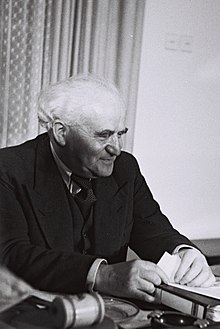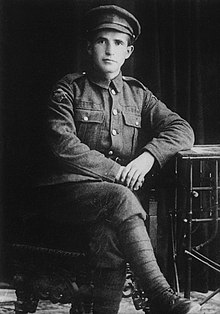David Ben-Gurion
David Ben-Gurion דָּוִד בֶּן-גּוּרִיּוֹן | |
|---|---|
 | |
| 1st Prime Minister of Israel | |
| In office 2 November 1955 – 21 June 1963 | |
| Preceded by | Moshe Sharett |
| Succeeded by | Levi Eshkol |
| In office 14 May 1948 – 7 December 1953 | |
| Preceded by | None |
| Succeeded by | Moshe Sharett |
| Personal details | |
| Born | October 16, 1886 Płońsk, Poland (Russian Empire) |
| Died | December 1, 1973 (aged 87) Israel |
| Political party | Mapai, Rafi, National List |
(Hebrew: דָּוִד בֶּן-גּוּרִיּוֹן, born David Grün on 16 October 1886, died 1 December 1973) was the first Prime Minister of Israel. Ben-Gurion's passion for Zionism, which began early in life, culminated in his instrumental role in the founding of the state of Israel. After leading Israel to victory in the 1948 Arab-Israeli War, Ben-Gurion helped build the state institutions and oversaw the absorption of vast numbers of Jews from all over the world. Upon retiring from political life in 1970, he moved to Sde Boker, where he lived until his death. Posthumously, Ben-Gurion was named one of Time Magazine 's 100 Most Important People of the Century.
Early life
Ben-Gurion was born in Płońsk, Congress Poland which was then part of the Russian Empire. His father, Avigdor Grün was a lawyer and a leader in the Hovevei Zion movement. His mother, Scheindel, died when he was 11 years old.
Ben-Gurion grew up to be an ardent Zionist and socialist. He immigrated to Palestine in 1906, shocked by the pogroms and rampant anti-Semitism of life in Eastern Europe.
In Palestine, he first worked in agriculture, picking oranges. Later, he became a journalist. After studying law at Istanbul University together with Yitzhak Ben-Zvi, he adopted the Hebrew name Ben-Gurion (Hebrew for "lion cub"). In 1915, he was expelled from Palestine, then under Ottoman rule, for his political activities.
Settling in New York City in 1915, he met Russian-born Paula Munweis. They were married in 1917, and had three children. He joined the British Army in 1918 as part of the 38th Battalion of the Jewish Legion (following the Balfour Declaration in November 1917). He and his family returned to Palestine after World War I after it had been captured by the British from the Ottoman Empire.

Zionist leadership
Ben-Gurion was at the political forefront of the Labor Zionist movement during the fifteen years leading to the creation of the State of Israel when Labor Zionism had become the dominant tendency in the World Zionist Organization.
An austere, ascetic idealist, he was marked by a commitment to the establishment of a Jewish state. In the Israeli declaration of independence, he stressed that the new nation would "uphold the full social and political equality of all its citizens, without distinction of race, creed or sex."
Ben-Gurion encouraged Jews to join the British military. At the same time he helped orchestrate the illegal immigration of thousands of European Jewish refugees to Palestine during a period when the British placed heavy restrictions on Jewish immigration. He is also considered the architect of both the Federation of Jewish Labor, the Histadrut which created a Jewish state within the British state and the Haganah, the paramilitary force of the Labor Zionist movement that facilitated underground immigration, defended kibbutzim and other Jewish settlements against attack and provided the backbone of the future Israeli Defense Forces. Both of these developments put pressure on the British to either grant the Jews a state in Palestine or quit the League of Nations Mandate - they did the latter in 1948 on the heels of a United Nations resolution partitioning the territory between the Jews and Arabs.
During the pre-statehood period in Palestine, Ben-Gurion represented the mainstream Jewish establishment and was known as a moderate. He strongly opposed to the Revisionist Zionist movement led by Ze'ev Jabotinsky and his successor Menachem Begin.
He was also involved in occasional violent resistance during the short period of time his organization cooperated with Menachem Begin's Irgun. Ben-Gurion initially agreed to Begin's plan to carry out the 1946 King David Hotel bombing, with the intent of embarrassing (rather than killing) the British military stationed there. However, when the risks of mass killing became apparent, Ben-Gurion told Begin to call the operation off; Begin refused.[1]
In September 1947 Ben Gurion reached a status quo agreement with the Orthodox Agudath Israel party. He sent a letter to Agudath Israel promising that the Shabbat would be Israel's official day of rest, there would be no civil marriages, and the Orthodox sector would be granted autonomy in the sphere of religious education.
Ben Gurion declared the establishment of the State of Israel on May 14, 1948. During the first weeks of Israel's independence, he ordered all militias to be replaced by one national army, the Israel Defense Forces (IDF). To that end, Ben-Gurion gave the order to fire on the Altalena, a ship carrying arms for the Irgun (also called Etzel). That command remains controversial to this day.
Prime Ministership
Ben-Gurion led Israel during its War of Independence. He became Prime Minister on may 14, 1948 and would remain in that post until 1963, except for a period of nearly two years between 1954 and 1955. As Premier, he oversaw the establishment of the state's institutions. He presided over various national projects aimed at the rapid development of the country and its population: Operation Magic Carpet, the airlift of Jews from Arab countries, the construction of the National Water Carrier, rural development projects and the establishment of new towns and cities. In particular, he called for pioneering settlement in outlying areas, especially in the Negev.
According to Benni Morris during the 1948 Arab-Israeli War Ben-Gurion ordered the expulsion of Palestinians from Lydda and from villages attacked during Operation Hiram. He adds that "Ben-Gurion was right [to order the expulsions]. If he had not done what he did, a state would not have come into being. That has to be clear. It is impossible to evade it. Without the uprooting of the Palestinians, a Jewish state would not have arisen here". [2]
In 1953 Ben-Gurion announced his intention to withdraw from government and settle in the Kibbutz Sde-Boker, in the Israeli Negev. He had a major in the reprisal operations that lead to the Qibya massacre at the end of 1953. He returned to office in 1955 assuming the post of Defense Minister and later prime minister.
Returning to government, Ben-Gurion collaborated with the British and French to plan the 1956 Sinai War in which Israel stormed the Sinai Peninsula in retaliation for raids by Egypt thus giving British and French forces a pretext to intervene in order to secure the Suez Canal after Egypt's President Gamal Abdel Nasser had announced its nationalization. Intervention by the United States and the United Nations forced the British, French and Israelis to back down.
Ben-Gurion was among the founders of Mapai which governed Israel during the first three decades of its existence. He stepped down as prime minister for what he described as personal reasons in 1963, and chose Levi Eshkol as his successor. A year later a rivalry developed between the two on the issue of the Lavon Affair. Ben-Gurion broke with the party in June 1965 over Eshkol's handling of the Lavon affair and formed a new party, Rafi which won ten seats in the Knesset. After the Six-Day War, Ben-Gurion was in favor of returning all the occupied territories apart from Jerusalem, the Golan Heights and Mount Hebron.[3]

In 1968, when Rafi merged with Mapai to form the Alignment, Ben-Gurion refused to reconcile with his old party. He favored electoral reforms in which a constituency-based system would replace the chaotic proportional representation method. He formed another new party, the National List, which won four seats in the 1969 election. Ben-Gurion retired from politics in 1970 and spent his last years living in a modest home on the kibbutz. Ben-Gurion is buried alongside his wife Paula in Sde Boker.
Commemoration

- Israel's largest airport, Ben-Gurion International is named in his honour.
- One of Israel's major universities, Ben-Gurion University of the Negev, located in Beersheva, is named after him.
Trivia
This article contains a list of miscellaneous information. (June 2007) |
- He learned Spanish so that he could read Cervantes' novel Don Quixote de la Mancha in the original. He believed this book was required reading for anyone interested in becoming an effective statesman.
- Ben-Gurion turned to the Feldenkrais method late in life in order to address recurring back problems. A famous photograph shows him standing on his head on the beach.
Footnote
- ^ . Paul Johnson, A History of the Jews, p. 523.
- ^ Interview with Morris in Haaretz, 09/01/2004, [[1]]
- ^ Randolph Churchill, Winston S.Churchill, The Six Day War,1967 p.199 citing 'The World at One' BBC radio, July 12,1967
References
- "Special Report David Ben-Gurion" BBC News.
- "David Ben-Gurion (1886-1973)" Jewish Agency for Israel.
- "The Identity of israel - David Ben-Gurion".
External links
- Articles with trivia sections from June 2007
- Prime Ministers of Israel
- Israeli party leaders
- Signatories of the Israeli declaration of independence
- Cold War leaders
- Former Members of the Knesset
- Zionists
- Israeli Jews
- Jews in Ottoman and British Palestine
- Polish Jews
- Istanbul University alumni
- 1886 births
- 1973 deaths
